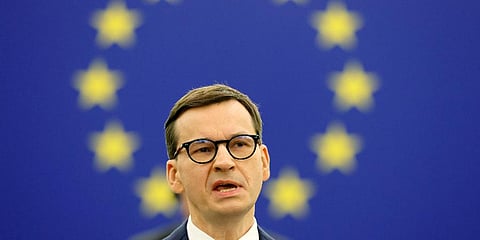

BRUSSELS: European Union leaders will pressure a defiant Polish Prime Minister Mateusz Morawiecki on Thursday to fall back into line on recognizing that EU law trumps national decision-making, hoping that dialogue will stave off a fundamental crisis in the bloc.
Morawiecki this week painted a picture of an overbearing union treating its 27 member nations as mere provinces, free to impose values at will against the wishes of sovereign people. Almost all other countries countered that respecting common rules and values is essential in a bloc if it is not to unravel.
If the sniping and accusations continue unchecked it could turn into the biggest institutional crisis for the EU since the United Kingdom decided to leave five years ago.
“We have to strictly remind everyone that those rules have been chosen. And if they no longer apply, there no longer is a European project,” said France's Europe Minister Clement Beaune in Paris early Thursday.
“France provides financial aid to Poland every day and you cannot help someone who refuses to respect a deal that was jointly signed,” Beaune told LCI, raising the specter of financial penalties if Warsaw refuses to change its ways.
“It is easy to get the money and the advantages that Europe brings and then not respect the rules,” he said.
EU Commission Vice-President Vera Jourova agreed but insisted financial measures could follow. “We prefer dialogue,” she said, “but we will need other instruments, if needed.”
Still, France threw itself behind the stance of German Chancellor Angela Merkel, who has called for calm, dialogue and compromise since the bloc could ill afford such a fundamental fight as it seeks to emerge from the biggest economic crisis in its history.
EU nations have warned for years against what they see as a backsliding of democratic principles in Poland when it comes to an independent judiciary and a free media.
They said the conservative PIS government stacked the constitutional court with handpicked judges and then see the same court challenge the supremacy of EU laws, arguing it should be subordinate to key national values in cases where they diverge.
It is a power play between a nation and the EU which also set Britain on course for Brexit. The extent of the legal move of Poland's constitutional court to question the supremacy of EU law is unprecedented however, officials said.
The EU aims to present a united front that makes its 27 nations a formidable power in the world, while they would be bystanders just as individual countries. But even if member states are happy to see that power used in international relations, some abhor it when it affects them.
Morawiecki defended his country’s stance that the highest law in Poland is the country’s constitution. Yet he has brushed off comments from opponents of his government who fear that the court’s ruling has put the country on a path to a possible exit from the EU.
The European Commission has several options to try to make Warsaw comply with EU law, notably by continuing to hold up the country’s access to billions of euros in European money to help revive its economy in the wake of the coronavirus pandemic.
The EU’s executive arm can also start infringement procedures, or decide to activate a mechanism allowing the suspension of payments of EU money to a member country breaching the principles of the rule of law in a way that affects the bloc’s budget or financial interests.